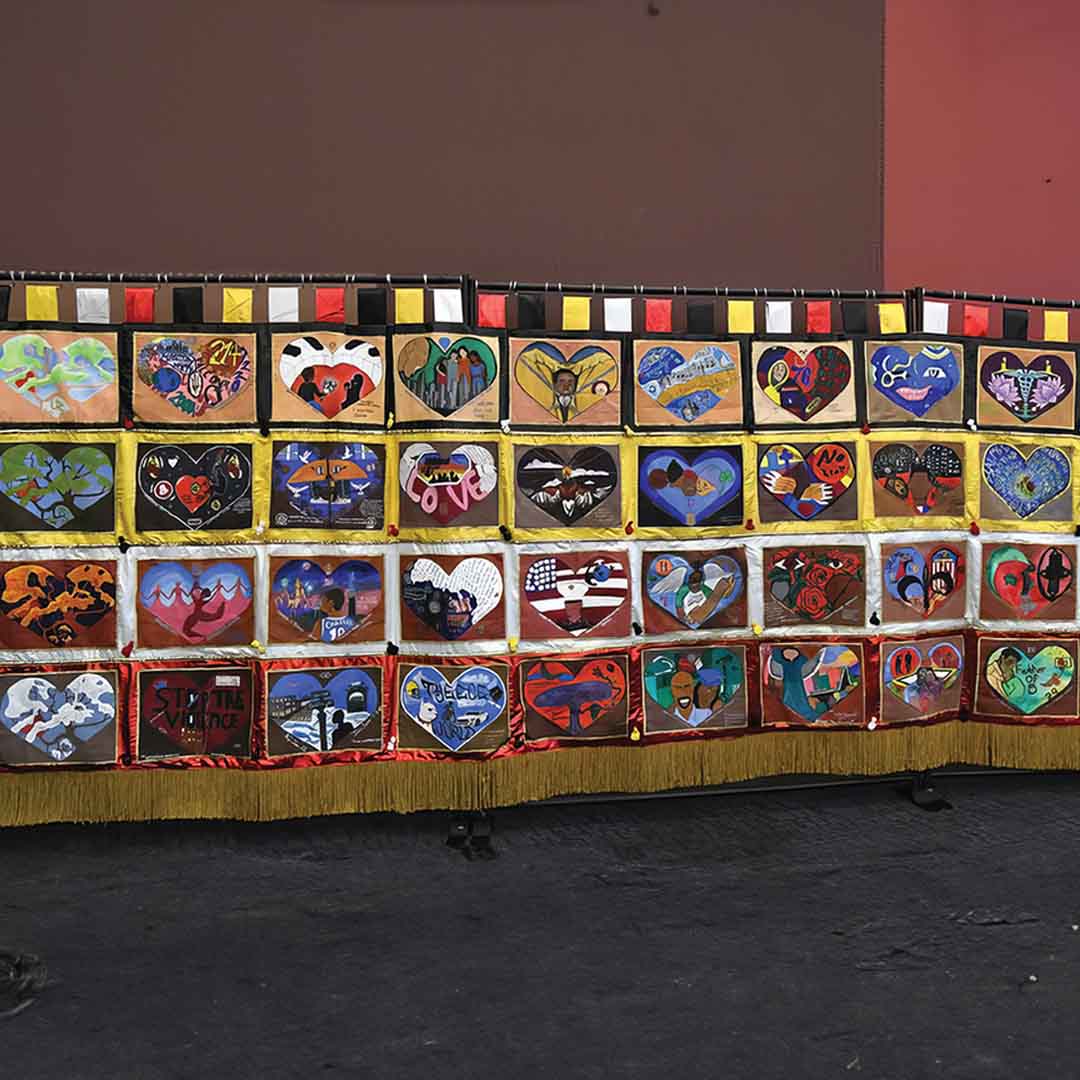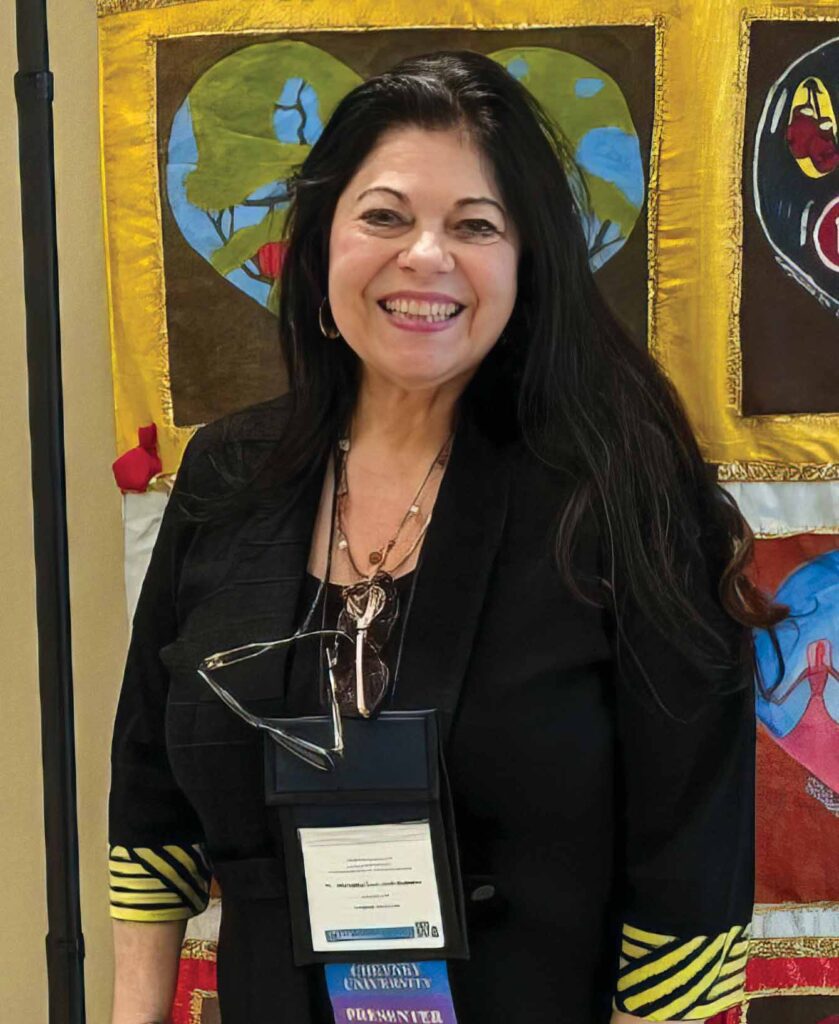Dr. Marietta Dantonio-Madsen: A Divine Calling

Wilmington University alumna and adjunct professor Dr. Marietta Dantonio-Madsen has dedicated her career to serving multicultural populations through art.
“Whenever I see a need, I have always felt that if I have a skill set that can help different people and communities, I feel responsible to help them,” she says. “When I pray, if I feel directed to serve people, I always do what is asked of me.”
Much has been asked of her through prayer, which is why Dr. Dantonio-Madsen considers every project a privilege. “I trust I am being directed by God,” she says. She has also felt a connection to Dr. Martin Luther King Jr., who believed in life’s inter-connectedness. In a sermon, he said, “All life is interrelated. We are all caught in an inescapable network of mutuality.”

“By working harmoniously, we can have a force of energy that consists of love rather than hate,” says Dr. Dantonio-Madsen. “That is the whole focus of my outreach work: It’s about the power of love.”
Dr. Dantonio-Madsen has spent most of her career in healing through the fine arts, having earned worldwide recognition and numerous awards, including President Obama’s Presidential Award for Lifetime Volunteer Service and the Smithsonian Award for Technology and Art. Her many presentations include “Transforming Your Trauma” for a conference at the African American Museum in Philadelphia, and creating the “Operation Desert Art” campaign, in which she raised $150,000 for art supplies sent to the U.S. Army in Saudi Arabia during Operation Desert Storm. She has also worked with the Delaware Department of Justice to create a Healing Arts curriculum for incarcerated youth in Delaware. Her juried exhibits have appeared at the United Nations, many local and international museums, and several countries, including India, Egypt, and South Africa.
She teaches Color Theory to undergraduates at WilmU, where she earned an Ed.D. in Higher Education Leadership. She is also the Arts and Humanities faculty chairperson and a professor at Cheyney University of Pennsylvania, where she founded The National Art Educators Cheyney University Fine Arts Honor Society and the Epsilon Pi Tau Technology Honor Society.
At Cheyney, she partnered with The Apologues, a traveling community museum dedicated to healing and assisting urban communities plagued by violence and trauma through the arts.
“I got a phone call from (television host and founder) Zarinah Lomax,” says Dr. Dantonio-Madsen. “She looked me up and saw all the projects I had done and wanted to collaborate. I told her I would as long as I could use my theories on how I approach healing arts projects.”
The project was called “Healing Arts Anti-Gun Violence, The Power of Love,” and resulted in a 20-by-8-foot tapestry and a documentary that focused on 36 families who had lost loved ones to gun violence. The intensive community effort joined Cheyney faculty and students who worked with families impacted by gun violence.
“Initially, I wanted 20 mothers to come, and we would match them with 20 students,” says Dr. Dantonio-Madsen, but many more showed up — and brought their families. For the tapestry, the artists chose to use heart shapes to represent the aching hearts, and individual panels depicted the stories of every murdered child.”
“I came up with a pattern,” says Dr. Dantonio-Madsen. “The students met the mothers and families, about 400 people in all.”
“By working harmoniously, we can have a force of energy that consists of love rather than hate. That is the whole focus of my outreach work: It’s about the power of love.”— Dr. Marietta Dantonio-Madsen
Dr. Dantonio-Madsen offered weekend painting sessions, served meals, and help from Cheyney’s Art Department and a brilliant seamstress, the tapestry was completed. She told her students to ask each mother (or family member) what message they would give their children in heaven if they had the chance. Those messages were added at the bottom of every panel.
Above the panels were the black, yellow, white, and red colors of the Native American Medicine Wheel. Dr. Dantonio-Madsen made 600 prayer ties of the same colors by hand for the families.
The project took a year. “It was an amazing celebration,” says Dr. Dantonio-Madsen. “The mothers had asked me to make t-shirts with their children’s names, so each parent, student, and volunteer got one.”
Dr. Dantonio-Madsen doesn’t believe in coincidences, so when magical things happen, she isn’t surprised. During this project, a colleague told her about Logo Motive, a printer in Rehoboth Beach, so she hired the company sight unseen to print the shirts. “When I went to pick them up,” she says, “the printer said, ‘I didn’t want to tell you this, but my husband was killed by gun violence in New York. I am still healing from it, and this project helped me.’”
That magical connection seems to transpire with every project Dr. Dantonio-Madsen takes on, perhaps because she embraces a calling to respect and celebrate diverse cultures and actively seeks to expand her understanding of the differences among people.
She has spent much of her own money on her work. “I don’t worry about funding,” she says, adding that she hates writing grants but grudgingly admits to their importance in the arts. “If this is what I’m supposed to do, the money will come, one way or the other.”
Dr. Dantonio-Madsen has a deep enthusiasm for delving into different cultures. For her dissertation, Libertas Creare: The Efficacy of the Cultural and Spiritual Connections in Healing Arts, she worked with the Delaware Lenape tribe in Dover, Delaware, to observe the effects of healing through the arts and ultimately establish a curricular framework.
She also formed a nonprofit called Totem Rhythms, which offers outreach to the Native American community and strives to maintain the cultural heritage of Indigenous American Indian peoples through totem pole-building projects.
Dr. Dantonio-Madsen comes across as someone entering a thrilling career path, notwithstanding her extensive decades-long experience. Her spirituality feeds her vitality and deepens her passion for fostering connections and building communities through art. To her, art inspires people to share stories and appreciate the beauty of diversity. Her teaching philosophy goes beyond the strokes of a brush; it encompasses fostering an inclusive environment where everyone’s voice is heard and celebrated.
With her work fêted worldwide, Dr. Dantonio-Madsen has left an indelible mark on those around her, and despite her success, she remains humble.
“I’m called to do this work,” she says. “So, I’m fearless.”
— Maria Hess



